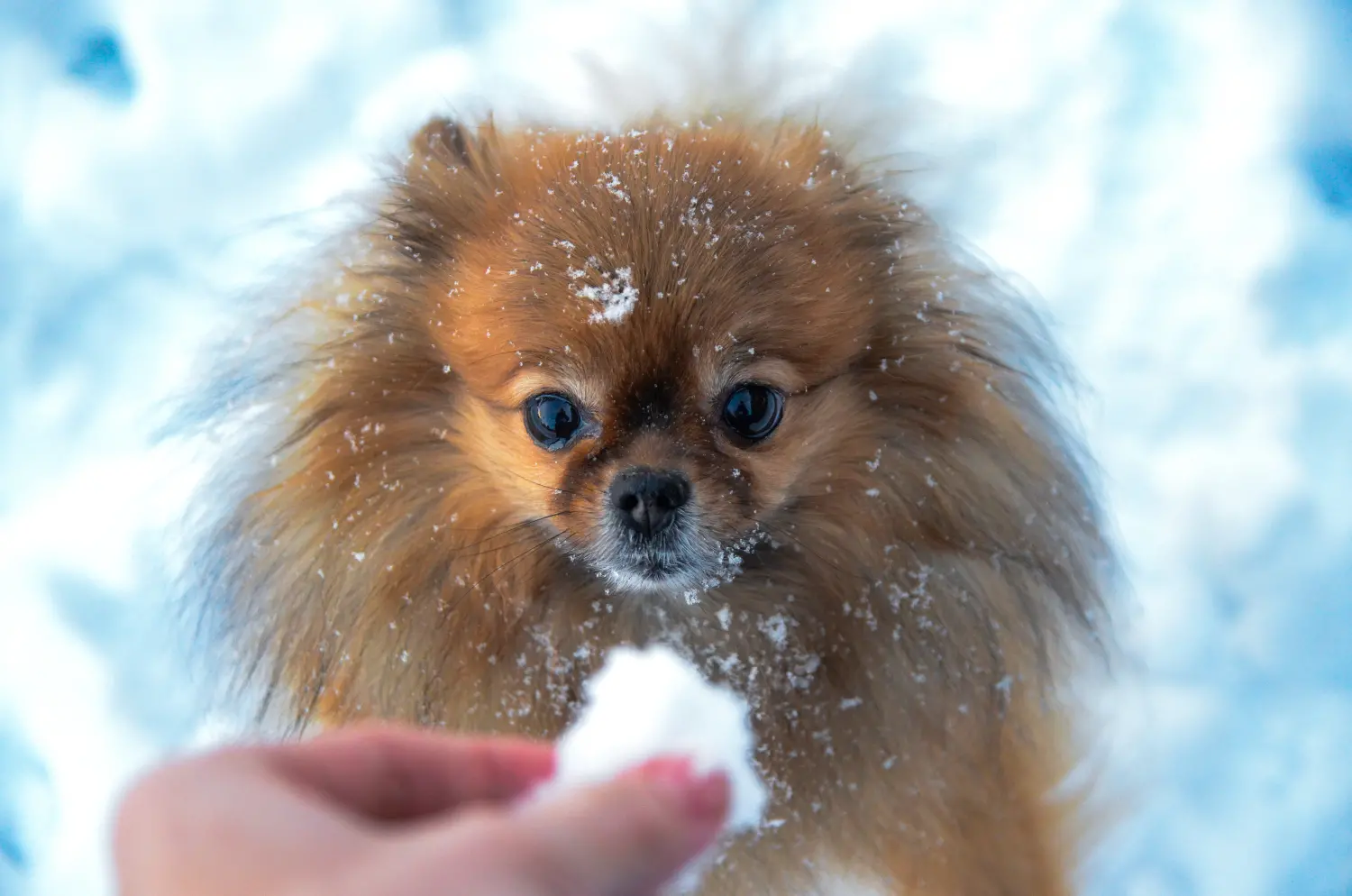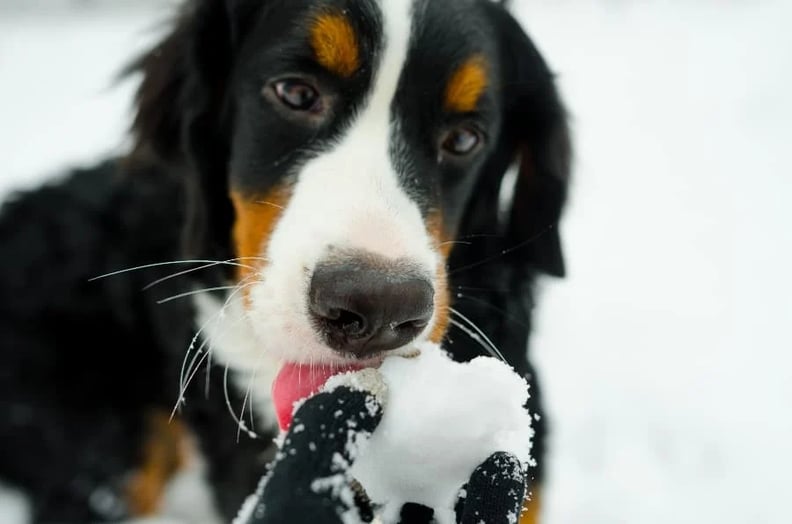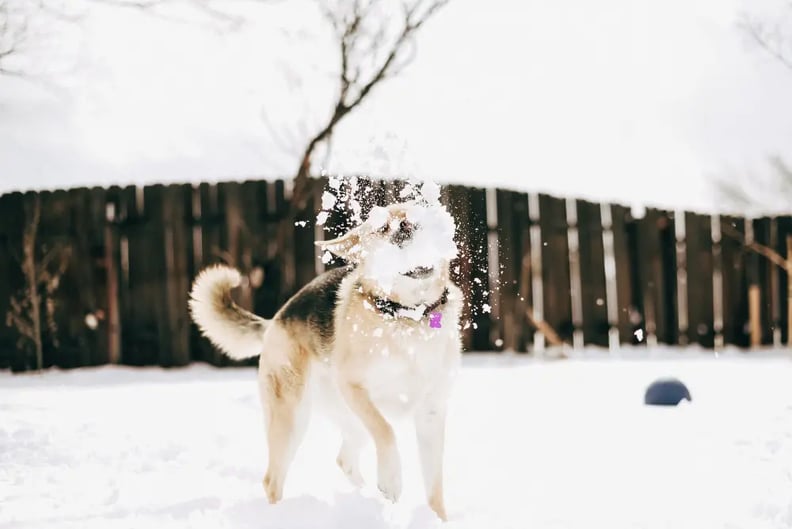
When the great outdoors turns into a winter wonderland with a blanket of fresh snow, your pup probably can't wait to go outside to play and eat snow. Not only do people like winter sports, dogs look forward to playing in the cold stuff. Some dog breeds even thrive in the snow such as Malamutes, Siberian huskies, and more.
During wintertime, is it really bad for dogs to eat snow? Watching your furry friend devour the icy white stuff might make you concerned.
In this article, we'll explore snow safety for dogs.
Why Dogs Eat Snow?
There are a lot of theories about why dogs eat snow. Maybe it's just in their DNA to make use of a water source when available, or maybe a dog eating snow and ice is just fun for the pooch..
Breaking down the facts on why a dog eating snow is a natural process:
-
- To Quench Their Thirst: If you have just taken Fido for a wintertime walk, then the pup might be thirsty. Eating snow is a refreshing way for your dog to enjoy a drink.
- The Call of the Wild: Many pet owners are surprised to learn that their furry sidekick still has extraordinarily strong instincts that go back to their wild ancestors. Wild canines in cold climates will eat snow as a way to hydrate when the lakes, streams, and rivers are frozen.
- Possible Major Health Problems: Yes, it's natural for some to eat a little snow, but it's not acceptable for a canine to obsessively eat snow. If your dog seems to have an unquenchable lust for the icy white stuff, then it could indicate a health condition. Major health conditions like Cushing's disease and kidney disease can all cause a dog to eat fresh snowfall.
- Induce Vomiting: Many people will say my dog ate snow and then vomited. On occasion, a dog eats snow with the sole goal of vomiting. It's just like your dog eats grass. Maybe your pup has a tummy ache and feels the need to vomit. Eating lots of snow not only leads to brain freeze but vomiting.
- They Like It: When you see a dog eat snow, the reason behind the action might be as simple as the fact that the pet likes the snow. Yes, dogs love catching snowflakes and licking frozen water for the same reason humans do. They love the cold sensation, it's refreshing, and fun.
Dangers of Eating Snow

It can be. Freshly fallen snow in small amounts is fine, but dirty snow could be dangerous. You might wonder why your pup would eat dirty snow. Well, the dog might not view yellow snow as dirty because they are often attracted to the urine of other animals.
Even the whitest, freshest snowfall could contain contaminants. Contaminated snow can occur on walkways and roadways where harmful ice melts are used. Also known as rock salt, the chemical ice melt solution can contain potassium chloride, sodium chloride, and other toxic chemicals which can lead to upset stomach, kidney failure, and even death in small quantities.
Never let your dog drink melted snow or slush. It is very possible that the snow has absorbed contaminants, bacteria, or chemicals from the ground it melted on. Large quantities of dirty water aren't safe for dogs.
Also, be mindful of harmful objects that could be in the snow, like rocks, trash, or sticks. You don't want your dog to break a tooth biting down on something, or choke on a piece of plastic.
How to Stop Dogs Eating Snow
So we've answered the question, ‘Is dog eating snow bad?' But what can you do to stop them?
Learn how to discourage the behaviour with the following tips on how to redirect a dog eating snow and ice.
-
- Offer a bowl of fresh drinking water during every outdoor outing.
- Only walk your dog on a leash so you can steer your dog away from the snow, and stay only on bare sidewalks and walkways.
- Bring a favourite fetch toy or dog treat to distract your pup from eating snow.
- Always place snow boots on your dog's paws to discourage the dog from licking the snowballs that accumulate in the canine's paw pads and hair on the feet.
- Don't stop moving. When you stop, other than for bathroom breaks, your dog will try to take the opportunity to grab a snowy snack.
Check out Frostbite on Dog Paws to learn more about the dangers of winter weather for dogs.
Gearing Up for Fun in the Snow
Most dogs love snow and in small quantities, clean snow is okay. However, you'll want to always gear up when the mercury drops to ensure that Fido stays warm in cold weather.
Before you head out into the wintry weather, you should invest in winter dog gear. At Homes Alive Pets, we offer a wide selection of dog snow gear.
-
- Snow booties: Dog Boots not only keep your pup's feet warm on a cold day, but they also protect your puppy's paws from snow, ice, salt, and chemical melts. They also provide protection from snow accumulation between the toes.
- Snowsuit: Why not invest in a full-body snowsuit? With water resistance and full body coverage, your dog is easily protected from the elements.
- Paw balm: The drying effects of winter weather and the exposure to snow and ice take a toll on your dog's paws. A soothing paw balm helps prevent soreness and cracking.
- Jacket: A winter jacket will provide your pup with core warmth when going for an outdoor hike or walk.
- Hat: Your dog's ears can become chilled, so a warm hat is a must-have winter gear item when playing in the snow.

Frequently Asked Questions About Dogs & Snow
Can dogs get diarrhea from eating snow?
A dog eating snow can lead to the pup having a stomachache due to a reduction in the temperature of your dog's stomach.
Can dog eating snow cause hypothermia?
If your dog is outside, then you'll want to watch closely so your dog does not consume a lot of snow, or your pet's body temperature may plummet, which will lead to hypothermia.
Can snow consumption lead to hypothermia even if my dog wears winter clothes?
Yes, even with winter clothing, consuming substantial snow can still lower your dog's body temperature and put them at risk of hypothermia.
Why should I be concerned if my dog eats a lot of snow?
Eating too much snow can cause a drop in your dog's core body temperature, making them susceptible to feeling cold and developing hypothermia.
What steps can I take to prevent my dog from eating too much snow?
To avoid the risk of hypothermia, limit the amount of snow your dog ingests and encourage them to drink fresh water instead. Also, keep an eye on their overall well-being in cold weather.
.png?width=200&height=66&name=logo%20(1).png)



